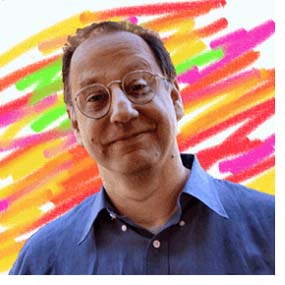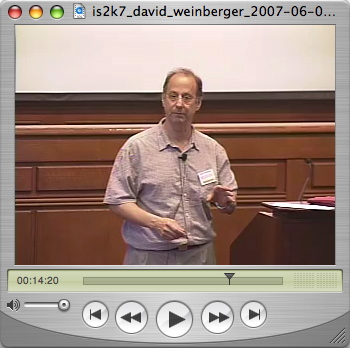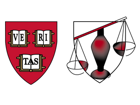Posts filed under 'David Weinberger'
Berkman Fellow David Weinberger investigates the origin of modern “information”, trying to understand what about it led us to embrace it as the dominant–paradigmatic–way of understanding ourselves and our world. David Weinberger will present an informal sketch of a direction, suggesting that we leaped into information because it reflected a long-held but squirrely metaphysics.
 Download the MP3
Download the MP3
…or download the OGG audio format!
November 11th, 2009
Berkman Fellow David Weinberger investigates the origin of modern “information”, trying to understand what about it led us to embrace it as the dominant–paradigmatic–way of understanding ourselves and our world. David Weinberger will present an informal sketch of a direction, suggesting that we leaped into information because it reflected a long-held but squirrely metaphysics.

Click Above for Video…or download the OGG video format!
November 11th, 2009
 David Weinberger
David Weinberger
Everything is Miscellaneous
Wired News/Berkman Center Podcast Series
In his latest interview for Wired, Berkman Fellow David Weinberger speaks with BBC News Director Richard Sambrook about the migration of news to online mediums.
As they discuss, there are a number of issues that come into play with this conversion, some that remove pre-existing controls and editorial rights that news outlets once held exclusively.
They are forced to reconsider the organization of information since a “front page” is no longer a broadsheet or a tabloid, but stretches as far down as someone is willing to scroll. And there are also more interactive tools that help the readers to decide what’s important or interesting, thereby wresting some predictability and control away from an intended focus. Their conversation continues as they address a number of other issues such interaction and fundamental change bring about.
The complete interview is available as a podcast, transcript, and MP3 download. David’s recent work, Everything is Miscellaneous, is also available on the Berkman Books page. The entire interview series with Internet luminaries is available on the Wired Blog.
June 27th, 2007
 David Weinberger
David Weinberger
Everything is Miscellaneous
Wired News/Berkman Center Podcast Series
The market for online travel information and booking seems pretty well covered by just a few dominant sites, yet Kayak.com has found a way to build off of their success with the information it aggregates. In his latest interview for Wired, Berkman Fellow David Weinberger discusses how cofounder Paul English implements the organization of information to compete in an established market.
A central principle of David’s latest work, Everything is Miscellaneous, is that the digital age has allowed users to demand and implement – instead of just imagining – their own levels of aggregation and organization. David and Paul explore this and much more in their conversation, which is available as a podcast on the Wired blog.
David’s recent work, Everything is Miscellaneous, is also available on the Berkman Books page. David’s entire interview series with Internet luminaries is available on the Wired Blog.
June 18th, 2007

QuickTime Video
David Weinberger, Research Fellow at the Berkman Center for Internet & Society and author of the new book Everything is Miscellaneous, offers some final words at Internet & Society 2007 on June 1.
Runtime: 19:32, size: 320×240, 55MB, .MOV, H.264 codec
June 17th, 2007
 David Weinberger
David Weinberger
Everything is Miscellaneous
Wired News/Berkman Center Podcast Series
Over ten years ago Craig Newmark began Craigslist as a community site for San Francisco. Today it plays host to over 17 million posts worldwide and receives 20 million visitors each month. Amazingly Craig has maintained the intended “non-commercial” characteristics of the site, which brings with it both pros and cons.
Berkman Fellow David Weinberger recently spoke with Craig for the latest in his series of interviews for Wired. The discussed both what has made the site so successful as well as the irony of the success that came from an unstructured, non-commercial enterprise that has been slow to adapt its structure.
In spite of competition from commercial sites, Craigslist has continued to grow in popularity, which relates directly to David’s latest work Everything is Miscellaneous, where he addresses the organization of information in the digital age and how the categories and placement of information in real space is badly outdated.
The interview is available as a podcast on the Wired blog and David’s recent work, Everything is Miscellaneous, is available on the Berkman Books page. David’s entire interview series with Internet luminaries is available on the Wired Blog.
June 14th, 2007

Librarians are the navigators of knowledge and access at University. As search and content companies further engage in the realm of University and its Library, how do the roles of library, librarians, and library tools evolve, particularly into digital space? With libraries embracing new content delivery services, creating their own digital taxonomies and resources, and negotiating new relationships with users and vendors, what are the implications for our greatest repositories of knowledge? New tools for mining, mashing up, and networking knowledge are evolving everyday, so how do libraries interface with copyright issues while still forwarding the mission of scholarship? Is there a conflict?
Facilitators: David Weinberger (Berkman Fellow), Jessamyn C. West (Librarian), Cathy Norton (Woods Hole Institute Library)
 Download the MP3 (time: 1:43:47).
Download the MP3 (time: 1:43:47).
To learn more about this working group session, visit the Internet & Society 2007 wiki.
June 13th, 2007

David Weinberger, Research Fellow at the Berkman Center for Internet & Society and author of the new book Everything is Miscellaneous, offers some final words at Internet & Society 2007 on June 1.
 Download the MP3 (time: 19:37).
Download the MP3 (time: 19:37).
June 6th, 2007
 David Weinberger
David Weinberger
Everything is Miscellaneous
Wired News/Berkman Center Podcast Series
Jimmy Wales is a Berkman Fellow, the founder of Wikipedia, and also the latest to speak with David Weinberger in a series of interviews for Wired Magazine.
 Download the MP3 (time: 22:21).
Download the MP3 (time: 22:21).
Having founded an Internet phenomenon that is rewriting, both literally and figuratively, what we can expect from a modern collection of information, Jimmy has a one of a kind perspective on what the guidelines and regulations are for a non-profit, user-generated account of everything.
In this interview, David and Jimmy talk about what the rules are for Wikipedia and how they help or hinder this unprecedented project. David’s recent work, Everything is Miscellaneous, is available on the Berkman Books page and the rest of David’s interview series with Internet luminaries is available on the Wired Blog.
June 4th, 2007
Everything is Miscellaneous
by David Weinberger
Book Release Party
Monday, April 30
Berkman Center for Internet & Society faculty, fellows and community join David Weinberger to celebrate the release of his book Everything is Miscellaneous through Times Books.
 Download the MP3 (time: 1:05:25).
Download the MP3 (time: 1:05:25).
David is a co-author of the national best-seller The Cluetrain Manifesto, has written for Wired, Salon, USA Today, and The Guardian, and in 2004, served as Senior Internet Advisor to the Howard Dean Campaign.
About The Book
For 2,500 years we’ve used the same principles for organizing information, ideas and knowledge that we use for putting away our laundry: Everything has its place, things are put with other things like it, it’s all neat and tidy. But as we move information on line, it no longer has to share the limits on the physical. We are rapidly inventing new principles of order, moving from newspapers to blogs, from encyclopedias to Wikipedia, from librarians to taggers. In fact, it turns out that the best way to manage digital information is *not* to have experts filter and sort it before hand, but to make a huge miscellaneous pile of it, include everything, and allow users to sort and organize it. This opens up new opportunities, but it fundamentally changes the nature of authority across all of our major institutions, including business, the media, science, education and government.
June 4th, 2007
Previous Posts
![]() Download the MP3
Download the MP3
 David Weinberger
David Weinberger


